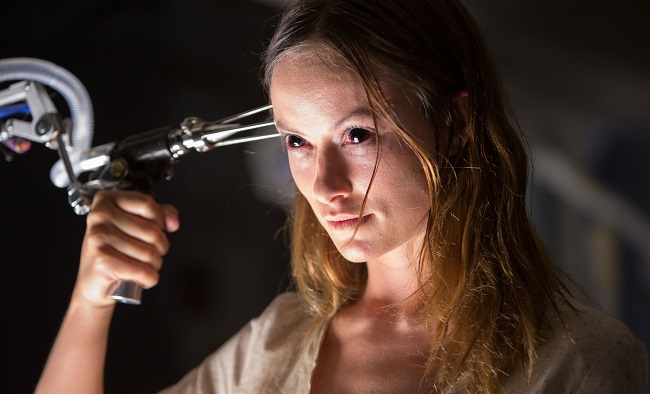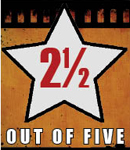

The Lazarus Effect has a pretty great little cast. I just wish it had more going for it than that. It certainly has an interesting concept: a group of scientists have developed a serum to stave off brain death in recently deceased patients so that doctors will have more time to bring them back to life without major consequences. That seems like a logline that carries a lot of horror potential. Unfortunately for audiences, the film never truly realizes it.
As the movie begins, a tight-knit group o' scientific pioneers (Mark Duplass, Olivia Wilde, Evans Peters, and Donald Glover … hot damn, what a nice cast!) are joined by a young documentarian (Sarah Bolger) just as they finally make a breakthrough on their experiments. Unfortunately, their progress has been monitored closely by a rather nefarious and greedy pharmaceutical company (led by Ray Wise, in a too-short cameo), and, after successfully resurrecting a dog, their research and discovery rights are snatch away from them via a legal loophole.
What a shitty thing to do to such a bright group bent on bettering the lives of others. Since this is a horror film, however, it's ultimately the least shitty thing that happens to our five protagonists. In a last ditch effort to reclaim their findings as their own, they sneak back into the lab facility they were tossed out of. Their intent? To recreate the experiment and document it again, thereby proving their claim to the discovery. Naturally, it doesn't go so well the second time around, and poor Zoe (Olivia Wilde) is accidentally electrocuted. Despite the misgivings of his cohorts, her fiancee/team leader Frank (Mark Duplass) decides to use the serum on her and bring his beloved back to life.
In the words of Jack Slater … BIG MISTAKE!
Look, you know where this is going. Person dies. Person is resurrected via "playing God" science. Person comes back changed and not for the better. It's well-mined territory, but that doesn't mean a new spin can't be put on it. There's always room for new takes on horror tropes, which is a main reason as to why the genre has lasted for so long and will continue to do so. Besides, it also helps when you have an actress as capable in the role as Wilde.
As I said above, the cast is great and all are game. Performances are not an issue here. The biggest problems facing this film are two-fold: the story and the direction. On the script side of things, subplots are dropped like a bad habit once we cross the halfway marker. That resurrected dog I mentioned earlier? Yeah, he's positioned as a potentially-deadly threat and one that is supernaturally-charged in his own right. So he factors into the Act Three carnage, right? Wrong. Once shit really starts to hit the fan, he completely disappears for the rest of the film.
How about that evil pharmaceutical company? Surely they have more diabolical deeds in store for us after their monkey-wrenching earlier in the film? Nope. It is mentioned at one point that they still have access to lab footage and must certainly know that Zoe has been brought back to life (and with newfound EEEEEEVIL abilities). This mini-discussion seems ripe for some old evil corporation shenanigans later on, but it never goes anywhere. We also have a recurring dream sequence that turns out to be a little more tangible than previously thought, but even the resolution of this subplot ultimately has no affect on the story. Instead it is tossed away in a gag straight out of Event Horizon (as well as countless other genre films).
As for the direction? I haven't seen this many instances of flickering lights and strobe effects in a horror setting since the last time I went through a cheapo beach boardwalk haunted house. This beyond-played-out stylistic technique is overused by director David Gelb so much in the film that at a certain point I stopped rolling my eyes and just started feeling embarrassed for those involved. I get that it must be challenging to ratchet up the tension constantly in what is mostly a one location film, but resorting to just lazily turning out the lights like a high school spookshow every five seconds is no way to go about it. It's even worse when doing so robs a rather creepy turn by Wilde of any real menace during the finale and forces her to simply perform jump scares at an ever-increasing rate.
There was a lot of potential here to make something interesting. The concepts are sound and the cast was more than game, so seeing it all just thrown away in such an astonishingly-fumbled third act is beyond disappointing. The Lazarus Effect isn't a terrible film, that cast alone sees to that, but it's certainly not a good one either. At the end of the day, it's just a massive pile of wasted potential squandered by a likely-hacked apart script and a director who was out of his depth.











